|
| IRAN NUCLEAR PROGRAM DEFIES UN | |
April 11, 2006 | |
|
LINDSEY HILSUM: Waiting for what they had been told would be good news about the nuclear program, Iranian dignitaries and foreign ambassadors summoned to the town of Mashad for an important announcement. President Mahmoud Ahmadinejad arrived. This, for him, was a triumphal moment. LINDSEY HILSUM: "Allah Akbar," they responded. It was, said the president, a day in history. According to the Iranian calendar, the 22nd of Farvardin, 1385. No mention of nuclear weapons or bombs. He went on to say that Iran planned to continue enriching uranium, until it reached an industrial scale, enough to fuel its nuclear power plants and provide electricity for the nation. Before the president spoke, the head of Iran's atomic energy organization made a video presentation, showing Iran's nuclear facilities. He said that, with their 164 centrifuges, they had enriched uranium to a level which can be used for nuclear power. But, by the end of the year, he said, they hope to have a plant which could output 3,000 tons of enriched uranium every year. This technology is dual-use. The Iranians might stop at nuclear power. But now they have the know-how, the breakout capacity. They could work on a bomb, if they chose. The president was mobbed by the audience after his speech. But the good news, as the Iranians had put it, did not go down well in London and Washington. The British Foreign Office said, his comments were not helpful. President Bush's spokesman said, Iran was moving in the wrong direction and the matter would have to go back to the UN Security Council. But President Ahmadinejad said, the West must respect Iran's right to peaceful nuclear technology. |
||||||||||||||||||||||||||||
| A moment of triumph for Iran | |||||||||||||||||||||||||||||
|
MARGARET WARNER: And for more now on the significance of Iran's announcement, we turn to two nuclear experts: Paul Leventhal, founder of the Nuclear Control Institute, an independent research and advocacy group in Washington that promotes nuclear non-proliferation; and David Albright, president of the Institute For Science and International Security, which studies nuclear programs worldwide. He worked with the U.N.'s nuclear agency, the IAEA, monitoring nuclear programs in Iraq. And welcome to you both. Paul Leventhal, how big a milestone is this, in terms of the technology required to produce nuclear weapons? They are now claiming -- and this should soon be confirmed by the international inspectors -- that they have enriched uranium. The quantity was not specified, but they have enriched it to the low level needed to -- to run nuclear power plants. And this will be seen by some as a crossing of the line, because, with that capability scaled up, they will have the ability to enrich to weapons-grade. And another ominous aspect of this is that, by producing low-enriched uranium, they are potentially producing feed for centrifuge plants that will require far less number of centrifuges and a far small quantity of uranium to reach weapons-grade, because, when you start with 3.5 percent enriched, you can achieve weapons-grade with much less effort than if you started with natural uranium, which is less than 1 percent of the fissionable isotope. So, it -- it's -- it's an ominous moment, I think. MARGARET WARNER: Do you find it ominous? Do you agree that they have really crossed a line here on the way to weapons development, if they chose to do it? MARGARET WARNER: The cascade is the number of... DAVID ALBRIGHT: This -- where the 164... MARGARET WARNER: ... the series of centrifuges. DAVID ALBRIGHT: And, so, it's not -- it's it was expected that they would start about now. And -- and it's -- whatever they enriched -- and I believe them when they say 3.5 percent -- it was a minuscule amount, far, far below anything they would need for a power reactor. And they're a long way from mastering gas centrifuges. They -- they really are just starting the process of learning to operate this cascade. (CROSSTALK) DAVID ALBRIGHT: And, so, I think we shouldn't exaggerate the significance of the event. |
|
||||||||||||||||||||||||||||
| Defying the international community | |||||||||||||||||||||||||||||
|
DAVID ALBRIGHT: Right. Yes. MARGARET WARNER: And the cascade is the series that -- it -- it takes a series of them to do this? DAVID ALBRIGHT: That's right, yes. So, they're connected together in parallel and in series. And, so, you, in series, enrich consecutively, and then raise the enrichment level in -- in -- in parallel, so you can increase the amount. And this is a very small cascade. But the significance is, if Iran learns to really operate this cascade reliably, then it can duplicate it. And, so, we would estimate they still need many months to do that. But, once they do master the operations cascade, then they're ready to go and -- and put together a -- a gas centrifuge plant, which could then produce enough material for nuclear weapons or produce some low-enriched uranium for some research purposes. MARGARET WARNER: So, bottom line, on a -- in a -- in a technological sense, do you think this is a big deal? I mean, this is the answer to the UN Security Council resolution that called on Iran to stop. I mean, this is a very dramatic and -- and blustering response to that, that we're not going to stop and we're going to, you know, try to declare victory, in a sense, and exaggerate what they have accomplished. And now it's up to the international community to come up with a response. MARGARET WARNER: Let's go back, though to the -- how significant this is, in terms of getting them to weapons, if they choose to do it. How long do you think it would take, Mr. Leventhal, to move from this stage, of -- of 3.5 percent purity, to the 90 percent it takes for weapons? PAUL LEVENTHAL: That depends on what else is going on in Iran that we may not and probably do not know about. Iran has acknowledged moving scientists and equipment to unknown locations, in order to escape a possible bombardment by the United States or Israel. That, in itself, is a violation of IAEA safeguards, because you are not supposed to have secret facilities where fissile material can be or is being produced. And I think the... |
|
||||||||||||||||||||||||||||
| Could Iran make a nuclear weapon? | |||||||||||||||||||||||||||||
|
MARGARET WARNER: But let's just say -- could we say, for the purpose of argument, though -- let's say this is all they had. MARGARET WARNER: How long would it take? PAUL LEVENTHAL: And I -- and I would argue that it's very likely it's not all that they have. I would argue that they have a parallel program of some size. And I would also caution against a grand deception by Iran to play into Western perceptions of Iran as being technologically and industrially backward, and apparently having problems in facilities that they're letting the IAEA into, while, at unknown locations, they are proceeding with all the technological help and technology that money can buy. And I -- I think that the problem is the IAEA is being given the run-around in Iran, and Director General ElBaradei has not been altogether forthcoming in describing the full extent of just how extensive the concealment and deception program is. MARGARET WARNER: Do you think that's possible, that, in fact, they're actually further along than this? DAVID ALBRIGHT: Well, anything is possible. But -- but Paul is speculating. I mean, if you -- if you listen to what the U.S. intelligence community says, they say that Iran is -- is within 10 years of getting nuclear weapons, which is generally interpreted as they're going to need five to 10 years. And -- and we think that that process can be sped up by Iran, but it's still -- they're several years away. And people have been looking for these -- these parallel programs, the secret sites. I mean, the IAEA has been looking very intensely, intelligence agencies. And the evidence isn't there. But the concern remains. And -- and -- and that's part of the reason why the international community wants Iran to stop all uranium-enrichment activities. MARGARET WARNER: Now, if this is the first time they have gotten this far, just for the sake of argument, does that advance the date? Does that shorten that five-to-10-year estimate? DAVID ALBRIGHT: No, not -- not unless the IAEA inspectors come I mean, it's -- this -- this plant was -- is starting to enrich uranium, more or less, on an expected schedule. And it's -- and -- and we will -- you know, all these things need to be tested. And it's very important the inspectors remain in there. And it's also very important that the international community start to increase the pressure on Iran, that, in a sense, now is the time when sanctions have to be considered against Iran. MARGARET WARNER: So, that raises the question, Mr. Leventhal. You know, the Israelis, who have been very concerned about Iran's program, have always talked about the point of no return, a point to which Iran would get it, and -- and no longer need the outside world to help. In other words, they would have both the know-how and the material they needed to just proceed. Do you think this says they're at that point, or do they still need international assistance or sales to proceed; i.e., in other words, would sanctions -- if they could really choke off supplies to Iran -- could it still stop or retard the program? Long question. |
|
||||||||||||||||||||||||||||
| The international response | |||||||||||||||||||||||||||||
|
PAUL LEVENTHAL: Again, it depends on what may be going on that we don't know about. And -- and I think you have to listen carefully to what the former director of safeguards, Pierre Goldschmidt, had to say about the extent to which the Iranians made life extremely difficult for the inspectors, and the fact that inspectors are not free to go into military facilities that have been -- that have been identified by the Iranian opposition as places where material had been removed from other nuclear facilities that -- that were torn down and -- and leveled. And I would just want to make the point that, as important And, short of that, diplomacy has its limitations, because Iran can be expected not to voluntarily disclose the facilities where they may indeed have secret weapons development, secret fissile material production facilities. And there has been any number of disclosures, information provided by the Iranian opposition, that the IAEA has chosen not to pursue, primarily because there's no supporting evidence. And every time they raise evidence or information coming from the opposition to the Iranian authorities, the Iranian authorities go ballistic. MARGARET WARNER: David Albright, you said earlier that they still haven't demonstrated that they really can get this up and running, this whole cascade. What do you mean by that? And do they still need the rest of the world to sell them things to do it? DAVID ALBRIGHT: Yes. The -- the -- they need to learn how to operate a cascade. It's a very sophisticated device. And they -- and it's hard to get them to work together without breaking. And, so, they need to... MARGARET WARNER: You once used an analogy of a race car. DAVID ALBRIGHT: That's right. It's like, if you -- if you had a brand-new engine in a -- in a Now, the Israeli red line is when they go through that process and succeed. And it could be as early as six months or a year. And, so, that's -- for the Israelis, that's the big issue. In terms of foreign procurement, I mean, we don't think they need any more for -- if they wanted to build 1,500 centrifuges. But, at some point, they do need more from the international community. They're actually out now purchasing items, or trying to purchase items, around the world. And -- and there's a great effort to try to stop them, that it -- and if it's successful, it will inhibit their ability to build thousands of centrifuges. But it's not going to -- we don't think it's going to stop them from building enough centrifuges to make, let's say, one bomb a year. MARGARET WARNER: All right, David Albright, Paul Leventhal, thank you. PAUL LEVENTHAL: Thank you. DAVID ALBRIGHT: Thank you. |
|
||||||||||||||||||||||||||||
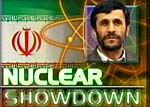
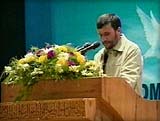 MAHMOUD
AHMADINEJAD, Iranian President: At this historical juncture, I announce,
in shadow of the Mahdi, the lord of time -- may we hasten his return
-- through the sacrifices of our scientists and our devoted youth and
the prayers of our brave people, we have mastered the nuclear fuel cycle
on a laboratory scale. And we have enriched uranium to the necessary
level for nuclear power generation.
MAHMOUD
AHMADINEJAD, Iranian President: At this historical juncture, I announce,
in shadow of the Mahdi, the lord of time -- may we hasten his return
-- through the sacrifices of our scientists and our devoted youth and
the prayers of our brave people, we have mastered the nuclear fuel cycle
on a laboratory scale. And we have enriched uranium to the necessary
level for nuclear power generation. 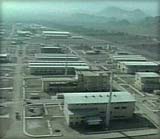 Iran's
nuclear program is thought to be spread over at least 50 sites. If the
164 centrifuges at Natanz are enriching uranium to 3.5 percent, it is
enough for nuclear power. And now they have mastered the process, they
could, at least in theory, enrich uranium to 90 percent, weapons-grade,
requiring some 2,000 centrifuges spinning to supersonic speeds.
Iran's
nuclear program is thought to be spread over at least 50 sites. If the
164 centrifuges at Natanz are enriching uranium to 3.5 percent, it is
enough for nuclear power. And now they have mastered the process, they
could, at least in theory, enrich uranium to 90 percent, weapons-grade,
requiring some 2,000 centrifuges spinning to supersonic speeds. 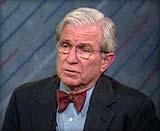 PAUL
LEVENTHAL, Founder, Nuclear Control Institute: Well, this is a moment
of triumph for the Iranian regime.
PAUL
LEVENTHAL, Founder, Nuclear Control Institute: Well, this is a moment
of triumph for the Iranian regime.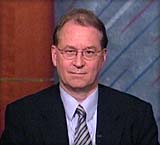 DAVID
ALBRIGHT, Institute For Science & International Security: It's significant
development, but it's -- it was not unexpected. I mean, they -- they
started this -- started working on this experiment on cascade in January.
DAVID
ALBRIGHT, Institute For Science & International Security: It's significant
development, but it's -- it was not unexpected. I mean, they -- they
started this -- started working on this experiment on cascade in January.

 MARGARET
WARNER: Now, just for our viewers, without getting too technical, the
centrifuges are machines that separate out different materials by spinning
them at very high speed, correct?
MARGARET
WARNER: Now, just for our viewers, without getting too technical, the
centrifuges are machines that separate out different materials by spinning
them at very high speed, correct? 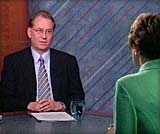 DAVID
ALBRIGHT: I think, politically, it's a very big deal.
DAVID
ALBRIGHT: I think, politically, it's a very big deal. 
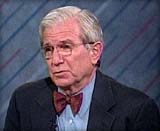 PAUL
LEVENTHAL: But we can't say that.
PAUL
LEVENTHAL: But we can't say that. 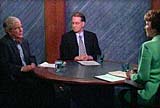 back
with new information, where Iran revealed something that they didn't
expect to find.
back
with new information, where Iran revealed something that they didn't
expect to find. 
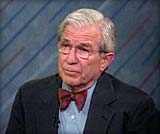 as
sanctions are, it's also important for the Security Council to empower
the IAEA to have the same kind of intrusive authority that it had in
Iraq, because that's what it is going to take if we are to find out
whether or not there is a parallel program.
as
sanctions are, it's also important for the Security Council to empower
the IAEA to have the same kind of intrusive authority that it had in
Iraq, because that's what it is going to take if we are to find out
whether or not there is a parallel program. 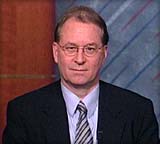 race car and you turn on that engine, that doesn't mean you're ready
to go out and race with it. And, so, you just need to test it out, and
make sure it works, it's not going to break down unexpectedly. And,
so, they -- they need to go through a process with this cascade.
race car and you turn on that engine, that doesn't mean you're ready
to go out and race with it. And, so, you just need to test it out, and
make sure it works, it's not going to break down unexpectedly. And,
so, they -- they need to go through a process with this cascade. 